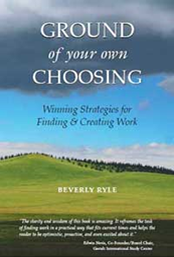The Pinch
by Beverly Ryle
I loved it when my parents would talk about me as a baby or a small child. I would listen with rapt attention to stories that made me the center of their universe and gave me a sense of what my life was like before I had the capacity for memory.
It didn't matter that the stories never changed, or that they were usually told at cocktail parties to get a laugh.
Whenever they would pull out one of their when-Bev-was-little anecdotes, it was as if suddenly I were thrust center stage with a small spotlight on me instead of hidden in the shadows cast by the crossbeams of their relationship.
As an only child, I cherished these moments and was perfectly happy to join in the laughter, even though it was at my expense, because it meant I was seen.
For a long time it never occurred to me to doubt their interpretation of events, but as I developed my own sense of who I was, I came to understand that what they were really sharing was their experience of parenting, not mine of being parented, and that the two experiences were very different.
As I grew older, I developed my own take on these stories, even the early ones about me as a baby, like the tale of "the pinch" which describes an event that happened when I was only six months old.
My father was a Marine, stationed at Cherry Point, NC, throughout World War II. In the spring of 1945, he was one of the few enlisted men able to secure on-base housing for his family - half of a furnished Quonset hut for himself, my mother, their beloved cocker spaniel, and me.
It was a very joyful time, by all accounts, particularly after the war ended in August and GIs were given railroad cars full of beer to celebrate. There was a good deal of partying before that, too, but while the war was still going on, liquor was not allowed on base. The rule was strenuously enforced, but my parents found a way around it, with my help.
In their version of the story, I am cuddled asleep in my mother's arms in the passenger seat of a car with bald tires and a trunk full of liquor. The car approaches the gate, and four hulking MPs come out to inspect it.
"As soon as they started toward us, I would pinch you on the behind and of course you would start to scream," my mother would relate, sipping her scotch and smiling with delight. "Then I'd scrunch up my face and look at you with motherly concern and say, 'Poor baby, I know you're hungry. Mommy will get your formula for you as soon as we get home.' They'd wave us through."
I've often wondered who came up with the idea to use me as a diversion to aid their smuggling.
Did my parents volunteer to supply liquor to friends and acquaintances because they were one of few couples with a car and a baby?
What happened when we got back home - did everyone praise them for their cleverness, laugh at the way they had deceived the MPs, pat my wobbly little head in recognition of my contribution? Did my mother notice the red mark on my butt when she changed my diaper?
Reflecting on my mother's actions in this story, what I have come to find interesting is how out of character they are.
My mother was a kind woman, not at all inclined toward physical punishment.
She didn't like to spank me, and on the rare occasions when she was provoked, she found it difficult to pull it off. Her arms would flay about in circles and land randomly, hitting me in places she had not intended, producing more sting than real pain and raising superficial welts on my skin that embarrassed her more than they hurt me.
And yet she had no qualms about pinching me.
Not only is the story of "the pinch" out of character for my mother – it doesn't fit with other stories about my babyhood as well.
I was a preemie, sickly and underweight, and so many of my mother's reminiscences concerned my delicateness and the tenderness with which she cared for me – getting up all hours of the night to feed me so I'd gain weight, wearing a mask and constantly washing her hands to guard against infection, searching for that special brand of milk that didn't make me fussy or cause me to spit up.
The more I thought about this little episode, the less sense it made to me.
When I had babies of my own it never once, for any reason whatsoever, occurred to me to pinch them to make them cry. Nor would it have occurred to my mother when she was generously helping me to care for them. A quiet or happy or sleeping baby was sacrosanct to both of us in the hard years when the four of them were all under the age of five.
So why did she pinch me? Why then?
She did it, without remorse, because at that moment booze was more important to her than the comfort of her child. The cunning, baffling and powerful disease of alcoholism already had its hooks in her.
When I was young, I thought the anecdote of my part in my parents' rum-running was just a funny, charming little story. This is because I viewed it as a one-time event without future consequences.
It was only when I became a mature adult I could see that what my mother viewed as a seemingly insignificant act, innocently done in the service of having a good time, had huge ramifications in both of our lives.
This was the moment when she crossed over a line she could not see.
She established the subtle but ominous precedent of employing me as a prop for her alcoholism, a precedent which over time would evolve into the pattern of routinely using me as a shield to deflect my father's anger at her drinking and occasionally throwing me in front of the train of his full-blown rage when she felt it was necessary to protect their relationship.
I know my mother loved me. I also know there were times when, like a power outage caused by a sudden storm, her addiction resulted in an interruption in her love and protection.
The pinch was the beginning.

Beverly Ryle is a regular contributor to this magazine and author of Ground of your own Choosing.
As a career counselor and business consultant, Beverly Ryle has been helping
corporate professionals, business owners,
and people-in-transition achieve their full
potential for over 25 years.
Bev runs the
Center for Career and Business Development
Eastham, MA
508 240 3532
www.successonyourownterms.com
An Invitation to
Break Out of the Pack
& Try Something Different!

To order go to:
Ground of Your Own Choosing
or
Amazon Books
 |
